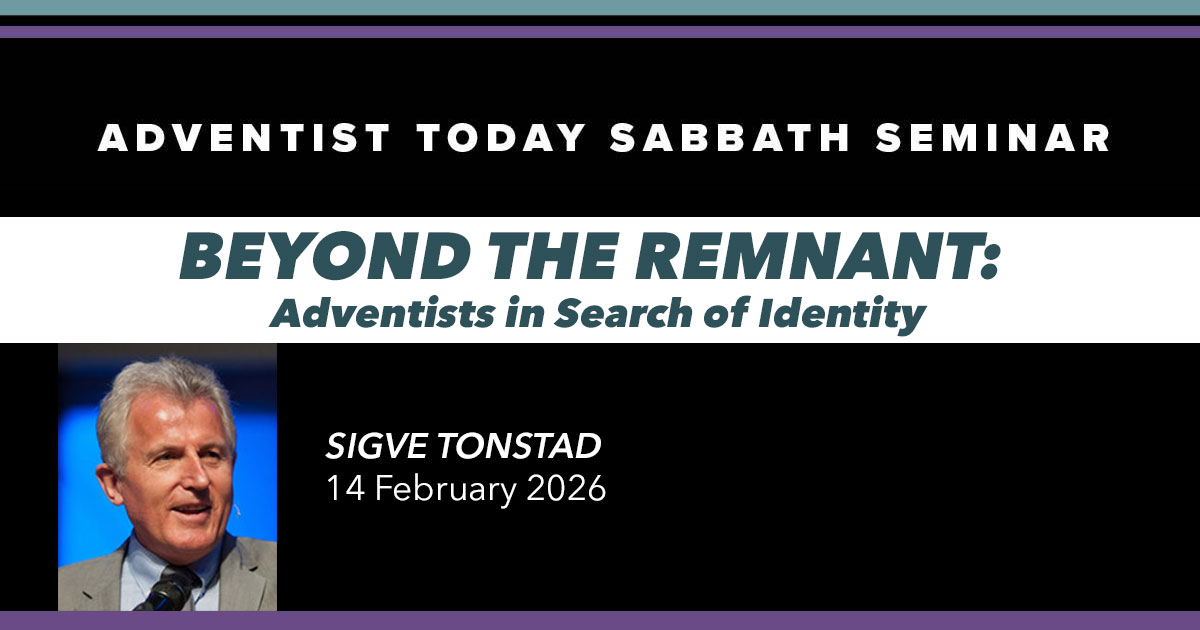For 17 years, Karla cared for children no one else would take. But when she found a young girl near death—and later agreed to take that girl’s unborn, drug-exposed baby— God began writing a miracle. This is a story of courageous love, relentless prayer, and a Saviour who specializes in impossible beginnings and rewriting a child’s future. Source: https://www.youtube.com/watch?v=seEjg8bt378
Mission Spotlight for February 14
Our Sabbath School program has always been linked to the support of the Seventh-day Adventist Mission program. This video provides a little insight into this important work.
C’è sempre una porta aperta #drittoalcuore
Nei momenti più incerti, cerchiamo sempre un appiglio. Il Salmo 130:7 ci dice che “presso il Signore è la misericordia”. Non serve essere perfetti. Non devi pagare nulla: la porta del suo amore è sempre aperta. Anche il tuo passato può diventare il punto di partenza per una nuova rinascita. #Misericordia #Speranza #VangeloOggi #HopeMediaItalia Source: https://www.youtube.com/shorts/er1cymWa-X8
ATSS: Sigve Tonstad, “Beyond the Remnant”

12 February 2026 | Faith, culture, and conscience shape identity—sometimes in ways that heal, sometimes in ways that wound. For almost two centuries, Adventists have identified ourselves as “the remnant church,” though we don’t always seem to agree what that means. In this class, Dr. Tonstad will challenge us to move beyond that identity. What […] Source: https://atoday.org/atss-sigve-tonstad-beyond-the-remnant/
Escaping the Angel of Death | Doug Batchelor
➤Subscribe to Doug Batchelor: http://bit.ly/2zptpvf ➤Free Online Bible School: https://bit.ly/31xiNbd ➤Support Amazing Facts: https://www.amazingfacts.org/donate-online?utm_source=SMFBP Check out some more Powerful videos: ➤The Devil's Deadliest Deception: https://bit.ly/2O6DpCc ➤Spiritual Warfare: https://bit.ly/2pAWCT1 ➤Hearing the Voice of God: https://bit.ly/2D4souJ Follow us on: ➤Twitter: https://twitter.com/amazingfacts ➤Facebook: https://www.facebook.com/AmazingFacts/ ➤Instagram: https://www.instagram.com/amazingfactsministry/ Source: https://www.youtube.com/watch?v=lLRbppGKZwo
Inside Story: Becoming a Rich Adventist
Inside Story for Friday 13th of February 2026
Rene Tucaldo is chief financial officer of the 1000 Missionary Movement, whose headquarters in Silang, Philippines, were constructed with the help of a 1996 Thirteenth Sabbath Offering. Read more next week.
Little Rene liked everything about Seventh-day Adventists. In his native province in the Philippines, all rich people seemed to be Adventist. They had big rice farms and a good standard of living. Rene wanted a similar lifestyle.
One day, several Adventist children invited him to read the Bible with them. Then the son of his father’s employer, an Adventist rice farmer, invited him to Sabbath School and church.
For the first time, Rene heard about the Sabbath. It sounded logical. He also noticed that the Adventist children dressed well. He liked that they didn’t swear. He wanted to be like them.
When he was 12, he was baptized and joined the Adventist Church.
He didn’t become rich, and his life seemed to grow worse. His family despised him for his faith and stopped supporting his studies. He was forced to quit school. After four years, he had had enough. At 16, he left the church and joined his father in the rice fields of the Adventist farmer. Soon he was drinking, smoking, gambling, and eating all kinds of unclean food.
Two years passed, and a 17-year-old named Rodel knocked on the door.
“I’m a missionary,” he told Rene’s mother. “Can I come in?”
“What kind of missionary?” she asked.
“1000 Missionary Movement,” he said.
“What’s that?” she said.
“I’m a Seventh-day Adventist missionary,” he said.
“Ahh,” Mother said. “My son is an Adventist, but he has backslidden.”
“Where is he?”
“He’s sleeping.”
As a hardworking farmer, Rene was exhausted. Mother led Rodel to him.
“My friend, why have you stopped being an Adventist?” Rodel said.
Rene was surprised but made it clear that he wouldn’t return to the church.
“My family hated me as an Adventist.”
“Can I invite you to church?”
“I don’t think so. I can’t go.”
Rodel left. But a year and a half later, when Rene was 20, he returned.
“My friend, come fishing with me,” he said.
Rodel didn’t try to convince Rene to go to church. He simply befriended him. They went fishing together. After a while, Rene found himself back in church on Sabbaths.
Friday: Further Thought – A Heavenly Citizenship
Daily Lesson for Friday 13th of February 2026
Further Thought
“Those only who are constantly receiving fresh supplies of grace, will have power proportionate to their daily need and their ability to use that power.
Instead of looking forward to some future time when, through a special endowment of spiritual power, they will receive a miraculous fitting up for soul winning, they are yielding themselves daily to God, that He may make them vessels meet for His use. Daily they are improving the opportunities for service that lie within their reach. Daily they are witnessing for the Master wherever they may be, whether in some humble sphere of labor in the home, or in a public field of usefulness.
“To the consecrated worker there is wonderful consolation in the knowledge that even Christ during His life on earth sought His Father daily for fresh supplies of needed grace; and from this communion with God He went forth to strengthen and bless others. . . .
“Every worker who follows the example of Christ will be prepared to receive and use the power that God has promised to His church for the ripening of earth’s harvest.”—Ellen G. White, God’s Amazing Grace, p. 117.
“God knows our wants, and has provided for them. The Lord has a treasure house of supplies for His children, and can give them what they need under all circumstances. Then why do we not trust Him? He has made precious promises to His children on condition of faithful obedience to His precepts. There is not a burden but He can remove, no darkness but He can dispel, no weakness but He can change to power, no fears but He can calm, no worthy aspiration but He can guide and justify.
“We are not to look at ourselves. The more we dwell upon our own imperfections, the less strength we shall have to overcome them.”—Ellen G. White, That I May Know Him, p. 224.
Discussion Questions
|
News from Southern Adventist University, ADRA, Guernsey, & Québec

12 February 2026 | News from Southern Adventist University Southern Adventist University in Collegedale, Tennessee, and Fulton Adventist University in Suva, Fiji have partnered to bridge Communications courses between the universities. Southern is offering online courses in 8-week sessions, such as Writing for the Media, Communication Theory, and Social Media Strategies. Over 70 students on […] Source: https://atoday.org/news-from-southern-adventist-university-adra-guernsey-quebec/
YESHUA – Concerto | LeVita
“YESHUA”. Concerto a cura del gruppo LeVita, registrato nella Chiesa Avventista di Parma in collaborazione con HopeMedia Italia. Guarda, ascolta e… condividi! Brani: 00:06:04 | Agnus Dei/Degno è l'Agnel – Michael W. Smith 00:11:34 | Scendi su noi – LeVita
00:20:17 | Grande Tu sei – Carl Boberg. Adattamento: Stuart K. Hine 00:26:10 | How great is our God – Chris Tomlin, Jesse Reeves, Ed Cash
00:31:00 | Gridiam di gioia – Darlene Zschech 00:35:43 | Holy forever – Chris Tomlin, Jenn Johnson, Brian Johnson, Jason Ingram, Phil Wickham
00:45:40 | Remembrance – Chris Davenport, Benjamin Hastings 01:00:49 | O come to the altar – Elevation Worship
01:11:24 | I can only imagine – Bart Millard 01:15:38 | Hymn of Heaven – Phil Wickham and Bethel Music
01:20:27 | Praise – Elevation Worship feat. Brandon Lake, Chris Brown, and Chandler Moore Voci: Andrea Puglisi, Rossana Lopez Vargas, Noemi Puglisi, Gabrielle Pozelli Burlandy, Jonathan Herrera, Zina Proteanu, Cesar Alberto Pavez. Strumenti: – Violino: Giulia Pozelli Burlandy – Piano: Alessio Puglisi – Chitarra acustica: Andrea Puglisi – Chitarra elettrica: Paolo Naso – Basso: Amos Lo Iacono – Percussioni: San Madnack – Batteria: Lorenzo Battista – Arpa: Ana Luíza Cicarini Lingua dei segni italiana (Lis): Francesca Dalfino Teatro:
Gesù: Gabriele Giaffreda
Samaritana: Laura La Venia
Nicodemo: Giovanni Caccamo
Simon Pietro: Miguel Uzun Mixing e Mastering: Andrea Puglisi Riprese e video editing: HopeMedia Italia Source: https://www.youtube.com/watch?v=rkjPF50r2vg
A Life Once Darkened by Addiction
Jorge’s story was once marked by addiction, selfishness and greed. Sadly, because of his choices, he was soon divorced. What would break through the darkness of his life in the city of Cordoba, Argentina? Make an impact in people’s lives today at https://awr.is/broadcasts. You can also watch Jorge’s entire story here: https://youtube.com/watch?v=I6kZIKwuIMg #AWR360 #AdventistWorldRadio #ChangedLives #HopeInChrist #Testimony #FaithJourney #GlobalMission #Shorts Source: https://www.youtube.com/shorts/919kGR2X3ho
- « Previous Page
- 1
- …
- 16
- 17
- 18
- 19
- 20
- …
- 4852
- Next Page »



